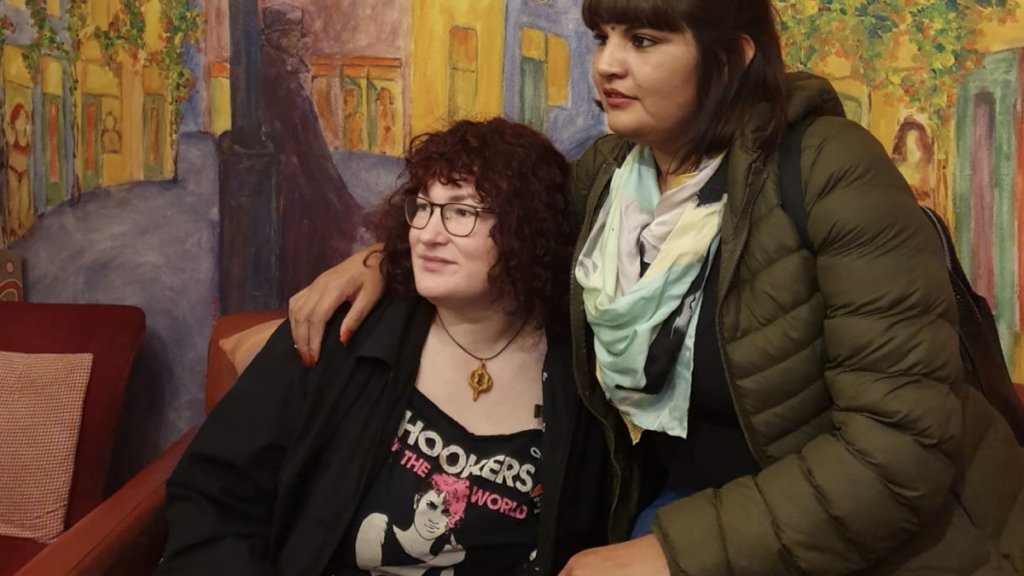Tara Burns has been on my radar for a decade, but I didn’t have the pleasure of actually speaking with her until last week. A sex worker, writer, researcher, and activist who lives off the grid in Alaska, Burns has been at the forefront of fighting bad policies surrounding sex work and sex trafficking. Since 2020, she has served as research and policy director for the Rhode Island chapter of the sex worker rights group Call Off Your Old Tired Ethics (COYOTE ), which recently put out Sex Work Policy: Participatory Action Research By and For Sex Workers, a great compendium of research conducted by Burns, COYOTE, other sex worker rights groups, and Brown University.
I interviewed Burns about the book, her work, and how so many sex trafficking laws end up backfiring. People would be surprised by how anti-trafficking laws “are most harmful to the people that they say that they’re intended to help,” she says.
Below is a transcript of our conversation, edited slightly for clarity and length.
Reason: The study that leads the book is from your research on sex work in Alaska. Can you tell us a little bit about that study?
Tara Burns: People started talking about sex work and sex trafficking in Alaska—in about 2012 or so, I started seeing all these things in the newspaper. And I was like, this sounds crazy to me, and I’ve been in the sex industry in Alaska for decades. And so I was like, “Well, there’s probably things that I don’t know that go on, right? And maybe I’m just in this little Pollyanna bubble of the sex industry, even though I was trafficked as a minor myself here in Alaska.”
Around that time, there was a young black sex-trafficking survivor who had just gotten out of federal prison after being charged with 24 counts of conspiracy to traffic, of conspiring with her trafficker who violently kidnapped her and held her hostage and abused her. She was staying with me after getting out of jail. And we talked a lot about our common experiences, and also what was different about our experiences of being trafficked as minors in Alaska. And I just thought, you know, what they’re saying in the newspaper doesn’t sound right, but I want to do the research and find out what is right.
About that time, I went to Desiree Alliance, in I think it was 2013. And then also right about that same time the movie came out, On Frozen Ground, which is about an Alaskan serial killer, Robert Hansen, who targeted sex workers, including a woman that I knew when I was growing up. So a bunch of us went to see that together, which was kind of like the genesis of our sex workers’ rights group here in Alaska. I was really lucky to meet Maxine [Doogan], and she was like, “Tara, what we need in our movement is research. We need you to go to school and do the research at a university with the academy behind you and everything.” So I did.
[My research was] action research—action research is a kind of research where we’re trying to understand a problem so that we can move towards a solution, and it’s a kind of research that’s used in school and workplace settings a lot. And then it’s participatory action research, which means we think the people who are closest to the problem are closest to the solution, and we’re looking to people who are involved in the sex industry to help design the research and understand the research.
Reason: Yeah, there’s really a sort of dearth of research on sex work and sex trafficking that is informed by sex workers themselves or conducted by them. How do you think that skews perceptions?
Burns: I think it skews it a lot, and it can even skew our own perceptions of ourselves, which can be really harmful. I remember way back in the day I used to be on this web forum called Stripper Web with a bunch of strippers. And there was breaking research that had come out and it was saying that 100 percent of strippers are victims of domestic violence. And somebody posted it on the forum and was like, “Is this true?” And everybody started being like, “Well, maybe.” We’re all sitting there, like, “Are we really?” And then somebody came along and was like, “You guys, you have to read the methodology section.” This was research that was done at a domestic violence shelter where the researcher worked. So of course 100 percent of the dancers that she met at the domestic violence shelter were victims of domestic violence.
Reason: That’s amazing.
Burns: Who would’ve thought? So one of the things that I’m really grateful for about my education at the University of Alaska Fairbanks is that there were classes about indigenous research methodologies and about decolonizing research. And we read this amazing letter by Eve Tuck, it’s an open letter to researchers about damage-centered research, and it talks about how it’s actually really harmful to marginalized communities to do this research that’s just so focused on damage and portrays us as damaged people, because we can start to take that on as part of our identity, which is really harmful.
Reason: One of the things that’s so interesting about this book that COYOTE put out is that it doesn’t sugarcoat bad things but it also doesn’t exclusively focus on them. It really has a nuanced portrayal of sex work, which is so refreshing.
Burns: Eve Tuck talks about theories of change and how using damage-centered research is a bad theory of change. And then one of the theories of change that she offers up instead is that story where the emperor has no clothes. Everybody’s under the spell—everybody’s just pretending along with him—and then the little boy points and laughs and that breaks the spell. The theory of change that I operate under is I’m the little boy who points and laughs.
Reason: What was one of the most interesting things to you when you first conducted your study at Alaskan sex workers?
Burns: So, I thought that there were probably people out there who were being helped by all of this anti-trafficking rhetoric and the anti-trafficking laws. I knew at that point of two sex workers who had been arrested for sex trafficking when they were not sex traffickers, but I thought, “We’re just collateral damage and something good is actually happening for some people who really need it.” What I found when I did my records request to find out all of the cases that had been charged under the new trafficking law: At that point, it was only sex workers who had been charged. And every sex worker who had been charged with sex trafficking had been charged with prostitution in the same case that they were charged with sex trafficking.
When I was designing the survey, I had put in there some questions to find out if people met the federal definition of a sex trafficking survivor or not. And when I filtered for the people who met the definition of a sex trafficking survivor, they were two or three times as likely to be sexually assaulted by police. And just every other bad thing on the survey—being turned away from services at shelters or by counselors or being turned away from trying to report a crime—all of it was happening to them two or three times more often than to other sex workers.
So I had thought that there were victims who were being helped, but actually it was those victims who were being the most harmed by the laws and the rhetoric. I think the same kinds of marginalizations that make people vulnerable to abuse within the sex industry can also make people vulnerable to abuse by police officers and discrimination by shelters and stuff like that.
(COYOTE Rhode Island)
Reason: How did you end up working with COYOTE?
Burns: After I did that research in Alaska, COYOTE was working with Brown University to basically reproduce it at Brown—which was really exciting, as a grad student, to have my research reproduced at someplace like Brown University. So Brown actually brought me down there and I spent a few days with COYOTE, and after that they hired me to write a couple chapters of this book, years ago. This book has been such a long time coming, and they hired me to do little things like that over the years. And then after the pandemic hit and I was just sitting home, Bella [Robinson], the executive director, called me and she was like, “Would you like to be our research director?” So it’s just been really amazing to work with COYOTE and to have the opportunity. We have some really amazing volunteers on the research team, especially Tatiana [Rothchild].
Reason: All of the studies in this book except for the first one, which was yours that you did in school—they were all conducted by COYOTE, right?
Burns: Right.
Reason: What is the goal of collecting all of these studies together and putting them out in book form?
Burns: We wanted to educate our community and we wanted to educate policy makers, because a lot of times people are looking at the wrong research. They’re looking at research that reflects what people think about us, people like police or nonprofit workers who financially benefit from our continued criminalization—they would not have their jobs if we were not being arrested and if we were not being court-ordered into services. A lot of times that’s where knowledge about our community is produced. And we wanted the world to know the truth according to the people who are being affected and the people who are being talked about.
Reason: Do you have a favorite bad study about sex work? You talked about how so much of the research out there is so bad.
Burns: No, I would hate to promote a bad study. All the bad ones are bad. Let’s not name them.
Reason: Good point.
Burns: That’s something I’ve learned from Maxine about political speech: Never name the bad thing. Just this last legislative session in Alaska—remember when people used to say that the average age of entry into prostitution is 13 years old or 12 years old or something like that? And that the average life expectancy of a sex worker was five years? We had a legislator who’s on our governor’s trafficking task force testify in Alaska, in 2024, that the average age of entry into prostitution is like 13 years old, and the average life expectancy of a sex worker is seven years. And she got up there and told that to her colleagues, trying to promote bad legislation to make sex workers and sex trafficking survivors register as sex offenders.
Reason: I’m teaching a journalism research class, and we were talking about how you need to pay attention to the population that’s being studied. And I told them how with one of those “average age” stats, the researchers actually only interviewed underage sex workers, and then people ran with that to say, “Oh, look, the average age of entry into sex work is under age 18.” But the study literally didn’t include any adult sex workers, so of course the average age of starting sex work in that study is going to be underage.
Burns: And then I think there also was a study in Australia with underage sex workers where they found that the average age that they first kissed a boyfriend was 13, and then that gets represented as the first [entry into] prostitution.
Reason: So now it looks like we did just repeat the bad studies!
Burns: But we did not tell people where to go and look for them.
Reason: In the sex work policy book, there’s this quote in the introduction: “The sex workers rights movement is first and foremost a workers movement. Lawmakers and police create our working conditions, so they are the bosses we turn to to negotiate for our labor and our safe work conditions.” Could you elaborate a little bit on that sentiment and what that means to you?
Burns: When I first started working here, I worked in houses with women who taught me how to be safe and taught me not to charge any less than the going rate and were there if I had a problem with a guy—which I never did. I was so safe, even though I was being trafficked to work there, that later, when I started working independently as an adult after I was done with dancing, it was kind of scary to me to be like, “Wow, we’re really all on our own.”
So I really quickly made friends who lived in the cities that I would go to to work. And when I would go to those cities I would stay with them, and I would email all of my customers and be like, “Hey, I’m staying with so-and-so, we should do a double, if you haven’t met her.” She would email all of her customers and be like, “Hey, Tara’s coming to town and she’s staying with me. If you haven’t met her yet, we should do a double.” So I really never met any client that wasn’t referred to me by a close friend, and I was always safe working at my friend’s homes. And also I wouldn’t have to leave my dogs home!
When they made the bad trafficking law in Alaska in 2012 that made it a big deal felony to have a place of prostitution, I had to stop getting referrals and giving referrals and working with my friends. And that meant that sometimes, in order to pay for hotel rooms, I would have to see clients that I wouldn’t otherwise have chosen to see. And I was really isolated in my work.
So just kind of on the personal level, I’ve always been able to see how the laws are affecting my ability to be safe.
But also, Alaska and Rhode Island both have such rich histories. In Alaska, in Fairbanks, where I grew up, the regulation of prostitution was established originally by an Episcopalian bishop who had been all over the west. He established—it was called The Line, in Fairbanks, where there was rent control by the city, and there was a police officer there, and all of the women had their little places right next to each other in case there were any issues. And it was very safe. Everybody said it was the safest line in the west. And then there was federal pressure to shut that down as Alaska became a state and as the military came up here. And when they first shut down The Line, there was a huge rise in customers being robbed. There was a huge rise in pimping. There was a huge rise in STDs. And then all of that culminated in a sex worker being brutally murdered. And the founding fathers of Fairbanks actually came together and were like, “No, we have to protect our sex workers,” and they reopened The Line. So just looking back through Alaska history—and Rhode Island history, both—you can very clearly see how laws affect our safety.
So as workers—who, of course, we want to negotiate for our labor and for safe work conditions—the people that we can negotiate with are the lawmakers.
Reason: And just for people who maybe don’t understand, you mentioned how you had to change a lot of your work conditions when the sex trafficking law passed. Can you explain a little bit why that made a difference?
Burns: The sex trafficking law made it a felony to have a place of prostitution. So if I went to my friend’s house and engaged in prostitution there, she could be charged with a serious felony. It made it a felony to induce travel for prostitution. If my friend said, “Hey, our mutual good client is coming to town this weekend, you should come down and stay with me,” that would have been a Class B felony, punishable by 10 years in prison. And also obtaining a customer for a prostitute or obtaining a prostitute for a customer were also, I believe, class B felonies. Every time that we sent out those emails being like, “Hey, we’re working together,” that could be a 10-year minimum sentence.
So I actually stopped staying with friends when I would go to Anchorage. And most of them were like, “But they’re not after people like us.” I was like, “Well, maybe not, but I don’t want to be the reason that you do 20 or 30 years in jail.” And then, sadly, one or two of the people who I warned about that—and they told me like, “Oh no, the cops aren’t going after people like us, they’re going after the bad guys”—ended up being arrested.
Reason: The ways that sex trafficking laws are used against sex workers are always surprising to people who are just coming into this issue. If people are reading COYOTE’s Sex Work Policy book and they don’t know a lot about this issue, what do you think that they might be most surprised by?
Burns: I think that people would be most surprised by how the laws are most harmful to the people that they say that they’re intended to help.
Reason: At the end of the book, you guys have some policy recommendations, and I won’t go through all of those, but I do want to ask what you see as maybe bright spots in terms of sex work policy—in Rhode Island or Alaska, or just in general—and also what you see as perhaps any sort of new obstacles?
Burns: I think it’s awesome that we’re seeing such a rise in immunity bills, which really help to reduce the harms of the prostitution laws. We did our first immunity bill here in Alaska, so it’s really exciting to see that spreading.
I think the brightest spots—and I don’t think that we talked about this in the book, the book was more aimed at policymakers and lobbying—but the best changes will have to come through the court system. Because anything that happens through the legislature can be changed the next year. Whereas with changes made through the court, like gay marriage, we have a constitutional right to equal protection under the law, which means that we cannot be discriminated against in marriage based on sex. And that can’t be changed. The legislators or the voters cannot go back and be like, “We disagree with the Constitution, so we’re going to make a look like against that.”
We have a great example of that here in Alaska, with the Ravin decision. This was a case back in the ’70s in Alaska where a guy was arrested for having a small amount of marijuana for personal use, and he went to court and said his constitutional rights were violated and the government does not have a compelling interest to violate his constitutional right to privacy over a small amount of marijuana for personal use. And the Alaska Supreme Court agreed with him and found that laws against the personal use of marijuana were unconstitutional. And after that, the voters decided that they wanted to criminalize marijuana. They put it on the ballot. It passed. So that law technically was on the books, but it could not be enforced by police, because it was unconstitutional and there was a Supreme Court decision protecting us from that.
Here in Alaska, we have some of the strongest privacy rights in our Alaska State Constitution. So what we really need—in every state—is, you know, we have a constitutional right to privacy in our consensual adult sexual relationships. We have a constitutional right to due process, to negotiate for our own labor and work conditions. We have a constitutional right to bodily integrity. So what we really need are court cases to inform the government of our constitutional rights and that they cannot be violating our constitutional rights with these prostitution arrests.
Reason: Is there anything else that you want to talk about that we haven’t touched on?
Burns: The COYOTE research team just had an article published in the Anti-Trafficking Review about the use of federal Office for Victims of Crime funds in Alaska. And it’s another bit of research that pushes towards a feminist research methodology of prioritizing the everyday experiences of the people who are supposed to be the beneficiaries of those funds. If you’re interested in ways to do research around these kinds of issues, that’s another great article.
More Sex & Tech News
• Neuroscientist and author Dean Burnett details how a new lawsuit filed by state attorneys against TikTok is steeped in pseudoscience. “This case misuses neuroscience so severely that it seems like it could potentially make it illegal in the US for young people to have fun,” Burnett writes on BlueSky. “And for the inevitable replies: YES, I have read Haidt’s ‘The Anxious Generation,'” Burnett adds. “YES, he has done research. So have I. So have countless professional researchers. We all think he’s wrong. NO, he doesn’t ‘make some good points’. He tells you what you assume it true. That’s very different.”
• Florida Gov. Ron DeSantis “is ramping up a taxpayer-funded advertising campaign against ballot measures that would overturn a statewide abortion ban”—that would be Amendment 4—”and legalize marijuana,” reports Jason Garcia at the Seeking Rents substack. “That’s not all. An anti-abortion nonprofit subsidized with state tax dollars has also begun paying for additional TV ads that complement the state’s anti–Amendment 4 spots.”
Today’s Image
Santa Monica | 2011 (ENB/Reason)
The post What Everyone Gets Wrong About Sex Trafficking Laws appeared first on Reason.com.







